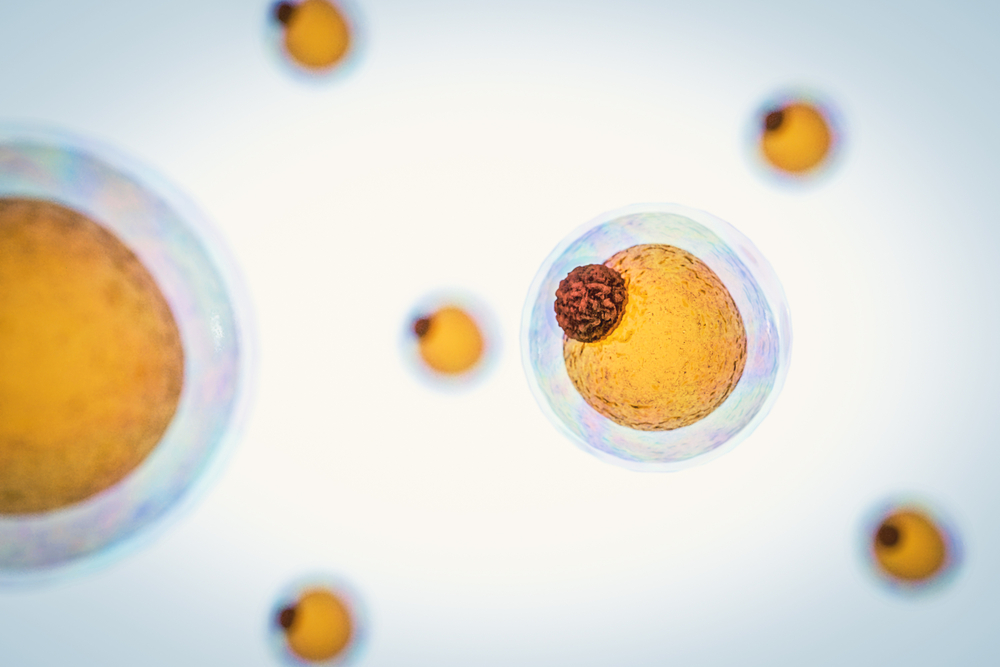Fat Tissue Cell Therapy Improves Scleroderma Patients’ Hand Function, Trial Shows
Written by |

Implanting some of scleroderma patients’ fat cells in their fingers significantly improved their hand function and overall disability, a clinical trial showed.
The STAR trial (NCT02396238) dealt with Cytori Therapeutics’ Habeo cell therapy. It involved placing fat — or adipose — cells under the skin of each finger.
Cytori presented the results at the Systemic Sclerosis World Congress in Bordeaux, France, Feb. 15-17. The poster session was titled “Adipose-derived cell therapy for hand dysfunction in patients with systemic sclerosis: a randomized, double-blind, placebo-controlled trial.”
Adipose tissue contains a lot more stem cells than bone marrow, and adipose cells are much easier to collect. One use of stem cells is rejuvenating tissue.
Cytori gathers adipose-derived regenerative cells, which have stem cell properties, from a person’s fat tissue to implant under their fingers. Using a person’s own cells avoids transplant problems such as tissue rejecting the cells.
Using patients’ own cells also means that doctors do not have to give them anti-rejection or immunosuppressant drugs.
Collecting the fat cells and delivering them to the fingers takes only four hours. Doctors gather them by liposuction, sucking them out from under the skin.
Preclinical-trial studies showed that adipose-derived regenerative cells can improve blood vessel regeneration, inflammation and fibrosis, or tissue scarring.
The key goals of the STAR trial were to see whether Habeo cell therapy could improve scleroderma patients’ hand function, and whether it was safe.
Researchers recruited 88 people with scleroderma hand dysfunction at 19 U.S. centers. They randomly assigned 48 patients to Habeo cell therapy and 40 to a placebo, administered to every finger.
The team measured hand function with changes in patients’ Cochin Hand Function Scale scores at 24 and 48 weeks. They used patient-reported evaluation tools, such as the scleroderma Health Assessment Questionnaire-Disability Index, to measure overall disability.
At 48 weeks, the hand dysfunction scores of 52 percent of the Habeo cell therapy patients had improved. This compared with 16 percent of the placebo group — a difference that was statistically significant.
In addition, 47 percent of the Habeo-treated patients reported moderate or better improvements in overall disability, versus 16 percent of the placebo group.
The overall-disability improvements were particularly evident in hand function measurements such as eating and gripping than in lower limb measurements such as rising and walking.
Habeo cell therapy also led to improvements in patients’ disease activity and quality of life, compared with the placebo.
“Impaired hand function is a serious problem for patients with scleroderma, for which there is no currently approved treatment,” Dinesh Khanna, the principal investigator of the STAR trial, said in a press release.
“The finding that patients already receiving current standard of care showed further sustained meaningful improvement in hand function in response to Habeo represents an important new potential approach in our ability to help patients counter the debilitating effects of this disease,” he added.
Habeo cell therapy was also safer than the placebo, researchers said.
As an example, only 2 percent of Habeo patients experienced serious adverse events, versus 12 1/2 percent of the placebo group.
In addition, none of the Habeo patients experienced a blood vessel problem such as hypertension, hypotension, digital infarction, or worsening of Raynaud’s phenomenon. This compared with 15 percent of the placebo group.
“Our complete analysis of data from the STAR trial is very encouraging,” said Marc H. Hedrick, the president and CEO of Cytori Therapeutics. “The safety profile exhibited by Habeo is clear, and the efficacy signals and trends are consistent.”
The company has given the U.S. Food and Drug Administration a detailed report on the findings. It plans to meet with agency officials soon about the next steps it should take toward potential regulatory approval.





